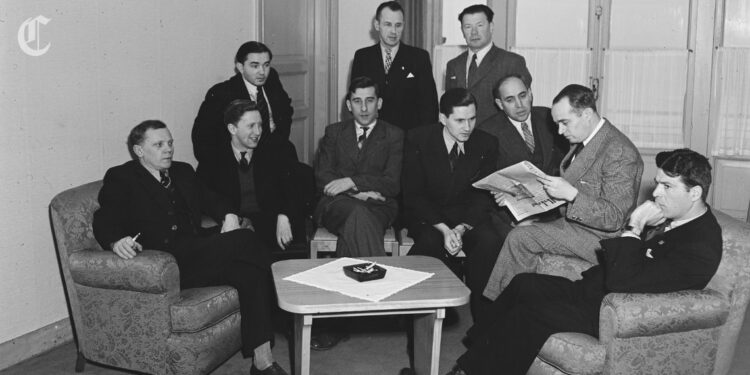Have you noticed that many of the top Grandmasters are Russian? And every time you meet someone from Russia, they just happen to play Chess?
That’s what this article is all about. We go over why Russians are so good at Chess.
Playing Chess in Russia is the equivalent to watching TV in the United States.
– The Chess Journal
Why Russia is so good at Chess
Chess is a competitive board game. It is played between two players only. Moreover, the game requires strategic skills, and the average time to play the game can be between 10 to 60 minutes. Of course, matches can go on for much longer in classical Chess.
The players are restricted to either white or black boxes on the board and each piece can only make certain moves. Now, as you become interested in the game of chess, you will find that Russians are seemingly extremely good at this sport. You might wonder, why is that? What Makes Russians good at Chess seemingly by default?
Russians are so good at Chess is because the Soviets significantly contributed to and invested in the game. Thereby, the game had become much more popular in Russia. The government sought to encourage this activity and it spurred quite a bit of interest in it among the people. Chess is in their culture. Chess is to Russia what fast food is to America.
History of Chess in Russia
Russians are good at chess due to the definitive history of chess associated with the Soviet Union. As the Soviets subsided this game, it became popular in Russia, and many people played the game of skill as a pastime.
Let’s have a look at how Russians involved this game in their lives. After the revolution, the Supreme Commander of the Soviet Union, Nikolay Krylenko, paved the path for a foundation for chess in the country. To strengthen the mental grip of people in this game, he forged forward and established many institutes for people to practice. This is why Chess was and still is popular in Russia.
Nikolay encouraged the creation of schools, hosted tournaments, and also promoted the game as a vehicle for international dominance. In addition to this, it was a perfect fit for the people of Russia as it only involved skill and was easy to afford.
The people of Russia took a chance to utilize their revolutionary skills by playing chess. They became perfect at the skillful game to such an extent that people often asked Russian players to lose to make a path for other players.
Russian Rules of Chess
As the game evolved in Russia, it gained dominance over other games and became the center of interest. After gaining dominance worldwide, the people of Russia made some improvements and modifications in the game.
Russians eliminated some of the previous rules of chess and replaced them with new ones. One of the rules of Russian chess included the movement of the Queen.
Previously, in the 18th century, the Queen could only move in diagonal and sideways; however, Russians introduced a new rule for the movement of the Queen. The Queen could now move like a knight in L-shape as well.
Greatest Chess Player of All Time is Also Russian
The name of chess is undoubtedly incomplete without referencing Garry Kasparov is the number one Grandmaster in the history of the game of Kings.
Garry Kasparov is the number Russian Chess master that holds the record for longest duration of time holding the number one spot in Chess, was a member of the World Chess champion, and also holds many undisputed professional and local chess records. Garry became the World’s Chess champion in 1985 at the age of 22 by defeating another Chess legend, Anatoly Karpov.
Chess Tips From Garry Kasparov
Study tactics and recognize the pattern. You need to practice often to acknowledge the design of the game, according to Garry, In addition, solving hundreds of positions is one of the most effective ways to strengthen your memory bank for chess.
Endgame studies and solving chess puzzles play a crucial role in studying chess tactics. Here’s a few tips from Garry himself on how you can improve at Chess.
Practice Against the Clock
As the love for chess enhanced amongst the Russians in the 19th century, the clock also became part of the game. However, practicing against the clock is one of the most efficient ways to counterpart your tactics. This is also helpful to test the speed of your hand in comparison with the moves you make.
Practice Over The Board
Garry emphasized playing on the Chess board physically in person, also known as playing over the board (OTB). If you play on the computer virtually, then playing on a physical board can drastically affect your skills.
Join a Chess Club
Playing virtually on the computer is suitable for practice, but you may not excel in the game until you practice physically with an opponent on a physical chessboard. Playing with an opponent will allow you to concentrate and engage in the game in a better way.
Joining a club is a much better option as you will get a rating on every game you play. Apart from the rating, you will learn and explore more about the game as well.
If you’re located in the United States and want to find a Chess club or group to join, refer to the United State Chess guide that has a guide full of resources for all 50 states.
Endgame: a revolutionary skill
Garry emphasized beginning with the endgame. This is because people of the Soviets in the early 18th and 19th centuries did the same. Starting with the endgame will teach the player about the power of pieces and engage the player more in the game as the player is well aware of the destination.
If you want more tips to improve, you can read the guide on how to get better at Chess.
Conclusion
Conclusively, Russians are deeply associated with chess; this is why they are better at it than anyone else. Moreover, the players of the 18th and 19th centuries gave a lot to the chess lovers of that time and contributed much to the flourish of the game. Hence, the game is only dominated by the name of Russians all over the world.
I hope this article on why Russians are so good at Chess shed some light on what makes them overall the best in the world at Chess. People in Russia, grow up with Chess. Something I wish I had growing up. Kids are raised playing Chess. Everyone plays Chess in Russia. I would go so far as to say, Chess in Russia is the equivalent to watching TV in the United States.
If you liked this post and are curious about other kinds of Chess questions like this, you might also want to read about whether or not you Chess requires a high IQ to be good.


